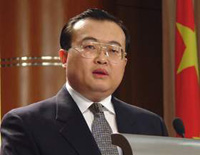 It is hoped that the International Atomic Energy's (IAEA) resolution urging the Democratic People's Republic of Korea (DPRK) to cooperate with an inspection of its nuclear facilities will help realize denuclearization on the Korean Peninsula, China's Foreign Ministry spokesman said Thursday.
It is hoped that the International Atomic Energy's (IAEA) resolution urging the Democratic People's Republic of Korea (DPRK) to cooperate with an inspection of its nuclear facilities will help realize denuclearization on the Korean Peninsula, China's Foreign Ministry spokesman said Thursday.
"China's position on the DPRK issue is consistent. We support and advocate for protecting peace and stability on the Korean Peninsula,'' Liu Jianchao said during the regular media briefing.
Liu said China hopes the various sides can peacefully resolve the problem through consultation and dialogue.
Liu's remarks followed the DPRK's announcement of the rejection on Wednesday of IAEA's request to "cooperate with the agency with a view to opening immediately all relevant facilities to IAEA inspection'' and its urging of the DPRK to "give up any nuclear weapons programme, expeditiously and in a verifiable manner.''
DPRK Foreign Minister Paek Nam-sun sent a letter to IAEA on Monday, saying it cannot accept the resolution "in any case.''
The letter also accused IAEA of handling the nuclear issue unfairly.
On Wednesday, IAEA Director General Mohamed El Baradei expressed the agency's determination to fully implement IAEA safeguards in the DPRK.
Liu's statement came three days after the summit between President Jiang Zemin and Russian President Vladimir Putin in which both sides called for a nuclear-free Korean Peninsula.
Chinese Foreign Minister Tang Jiaxuan, in a phone conversation with his Japanese counterpart Yoriko Kawaguchi on Wednesday, also expressed China's hope for all countries concerned to continue to abide by the 1994 agreement on Pyongyang's nuclear capabilities reached in Geneva between Washington and Pyongyang.
At the briefing, Liu also confirmed the People's Liberation Army General Staff Deputy Chief Xiong Guangkai will hold talks with US defence officials in Washington early next week.
Liu said the talks are taking place after an October agreement between Jiang and his US counterpart to resume military exchanges soon.
In another development, Liu said the US State Department's envoy for democracy and human rights, Lorne Craner, was due in Beijing later this month to meet Li Baodong, director of the Foreign Ministry's Department of International Affairs, to re-open human rights dialogue.
In response to reports that Japan has decided to send frigates to the Indian Ocean as part of its effort to fight terrorism, Liu said because of historical reasons, Japan sending troops overseas always drew concern from Asian countries.
China always hopes Japan will abide by its commitment of defend its own territory and coastal waters, Liu said.
(China Daily December 5, 2002)
|

